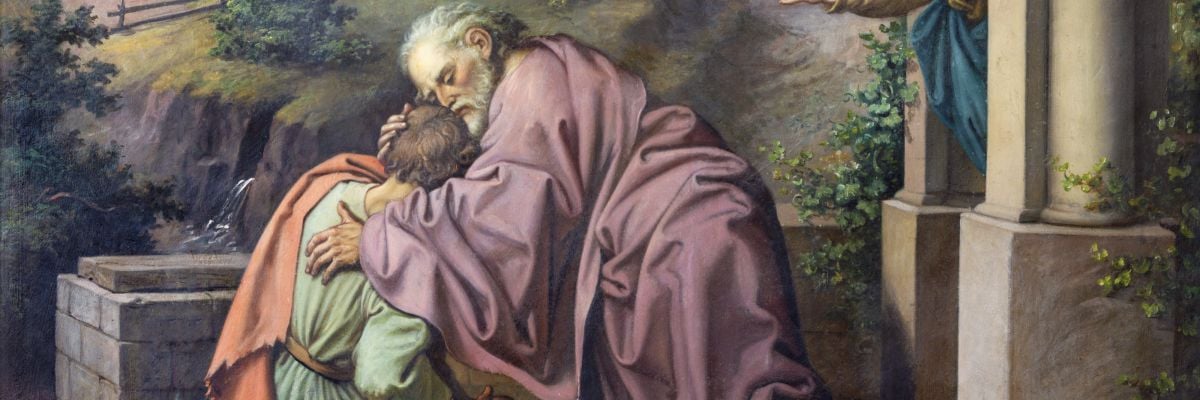
In the background of the parable of the prodigal son (Luke 15:11-32) is the life of the patriarch Joseph, one of the twelve sons of Jacob. There can be no doubt that Jesus intended us to compare the life of Joseph to the prodigal son. Consider these parallels between their stories:
- Both the prodigal son and Joseph had envious older brothers (Gen. 37:1-11).
- Both the prodigal son and Joseph leave their father and go to a far-off land where there is a famine (Gen. 41:54-57).
- Both are tempted to be intimate with women (Gen. 39:7).
- Both are temporarily enslaved in the far-off land (Gen. 39:20).
- Both receive a special robe from their father (Gen. 37:3).
- Both receive a ring (Gen. 41:42).
- Both are presumed dead by their father but found alive (Gen. 45:28).
- Both are reunited with their father by an embrace and a kiss. In fact, nearly the same words are used to recount both reunions: “Then Joseph made ready his chariot and went up to meet Israel his father in Goshen; and he presented himself to him, and fell on his neck, and wept on his neck a good while” (Gen. 46:29).
That’s not just three or four parallels—that’s at least eight! There are so many exact parallels that one cannot doubt that our Lord intended for us to consider his parable side by side with the story of Joseph. But in spite of the parallels, the differences are also striking:
- The prodigal son departs willingly; Joseph departs unwillingly.
- The prodigal son hungers from famine; Joseph feeds others during the famine.
- The prodigal son is a slave until he returns home; Joseph is made second in the kingdom while in that far-off land.
- The prodigal son receives a robe on his return home, Joseph before his departure.
- The prodigal son receives a ring from his father, but Joseph receives a ring from Pharaoh.
- The prodigal son is intimate with women; Joseph resists the advances of a woman.
- The prodigal son is embraced by his father; Joseph embraces his father.
- The prodigal son returns to his father in his original home; Joseph brings his father and his entire family into that far-off land.
What does this all mean? Christ is the key that unlocks all of Scripture. Both Joseph and the prodigal son represent Christ. But since Christ has both a human and a divine origin, being Son of Man and Son of God, the same story is told from the perspective of each. Fittingly, the Old Testament tells the story from the perspective of Christ’s human origin, whereas the New Testament tells the same story from the perspective of Christ’s divine origin. Let us see how each reflects the life of Christ.
The father in the history of Joseph represents Adam, the human origin of Christ, and from the beginning Christ is clothed with the robe of human nature upon coming into the world at the Incarnation. As man he takes no wife, resisting the inclination of human nature to be joined to a woman. He departs this world unwillingly at his passion, crying out “Father, if it be possible, let this chalice pass from me” (Luke 22:42). But he enters into the next life, a land far from this. He dwells in prison there only for a short time, for “he went and preached to the spirits in prison” (1 Pet. 3:19). Then, at his resurrection and ascension, he is raised up to the right hand of the throne of God the Father.
For in the story of Joseph, Pharaoh represents God the Father. Thus, the ring given to Joseph by Pharaoh symbolizes the eternal divinity and its union with Christ’s humanity, since a ring is circular, having no beginning or end, signifying eternity. And just as Pharaoh makes Joseph second in the kingdom, yet in such a way that he exercises the full authority of the King, so too does God the Father establish Christ at his right hand, exercising his full authority. From there Christ feeds hungry souls with bread from heaven, nourishing them with his own glorious flesh and blood. Finally, he welcomes tearful Adam with an embrace and a kiss and leads Adam and all his children into heaven.
The Father in the parable of the prodigal son is God the Father. His homeland signifies heaven, while the far-off land signifies this fallen world. Christ willingly departs from his heavenly home so that he might come to save us here in this fallen world, so far off from heaven. Upon coming into the world, Christ hungers and thirsts, experiencing famine while he lives in the “likeness of sinful flesh” (Rom. 8:3). He spends all and, in his divinity, he draws near to prostitutes and sinners, allowing them to be intimate with him in supernatural love.
But having emptied himself and having taken “the form of a slave (Phil. 2:7),” he subjected himself to the slavery of death, he rises up[1] again and returns to his Father, receiving the glorious robe of his resurrected body together with a ring that signifies the manifestation of his eternal divinity. He is welcomed by his Father into his original, heavenly home, where he shall forever rejoice in the heavenly banquet.
There is some question about who the envious older brothers represent in each story. In the story of Joseph, it seems that the envious older brothers are the leaders of the Jewish people: “he perceived that it was out of envy that the chief priests had delivered him up” (Mark 15:10). In the story of the prodigal son, I think the envious older brother can represent the devil. The Scriptures tell us that the devil was envious (Wis. 2:24).[2] But how can he be called older than the divine Word, since the Word existed before all creatures? Because he is old not in time, but in sin (see Dan. 13:52), which is why St. Paul calls the man subject to sin the “old man” (Rom. 6:6). Again, because the divine Word is eternally begotten of the Father, his begetting is eternally new: “This day I have begotten you” (Acts 13:33; Heb. 1:5; 5:5). And just as one who is further from birth is called older, so too all creatures are old in comparison to the Word who is eternally, newly begotten.
So there you have it. It is the same story. Sacred Scripture is truly miraculous. It is the word of God.
[1] The Greek word used in the parable when the prodigal son “rose up” is the same word used to signify Christ’s Resurrection.
[2] The envy of the devil was probably on account of the fact that God had become man.
This article is excerpted from Fr. Sebastian Walshe’s new book Secrets from Heaven, published by Catholic Answers Press.



